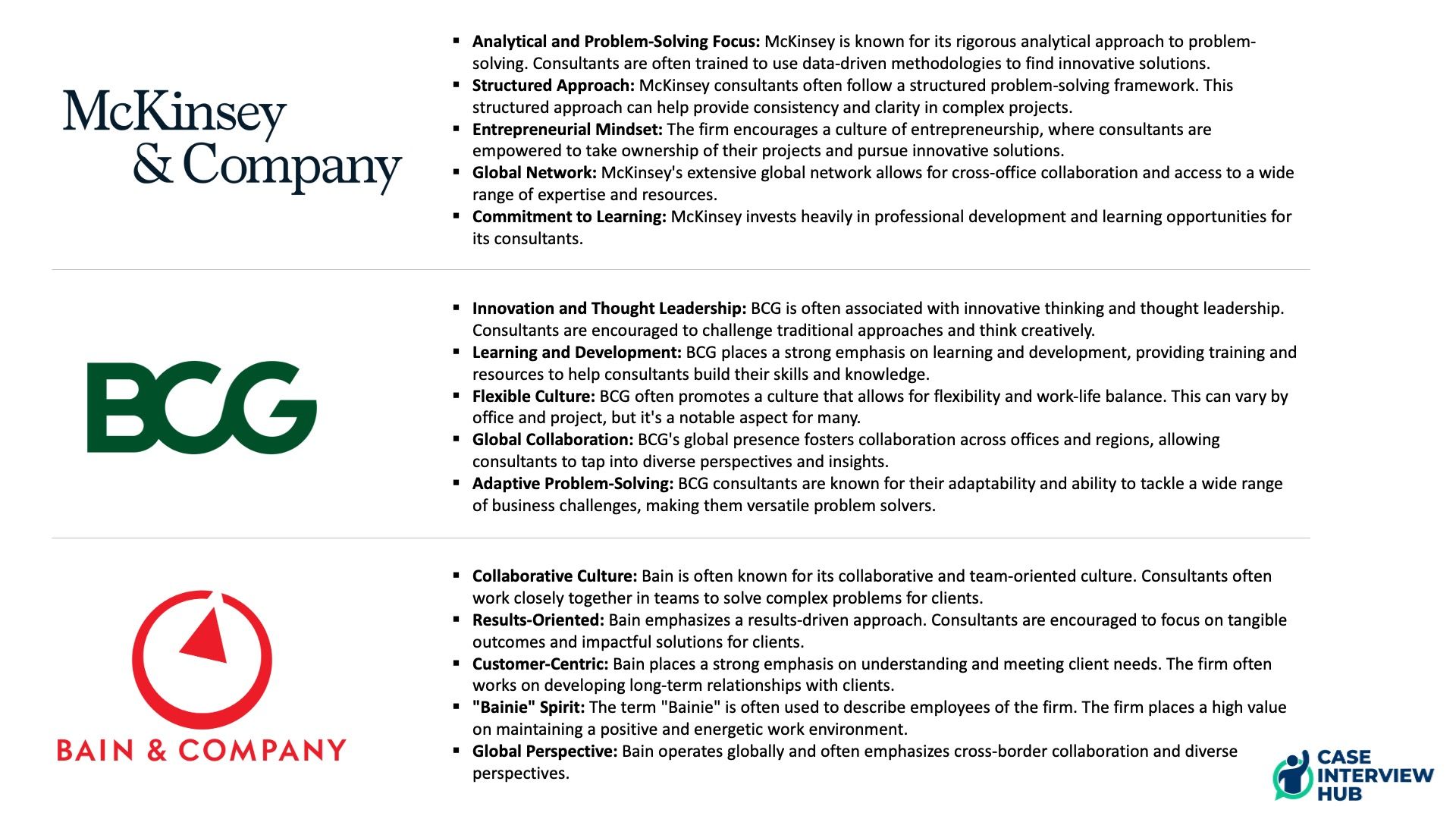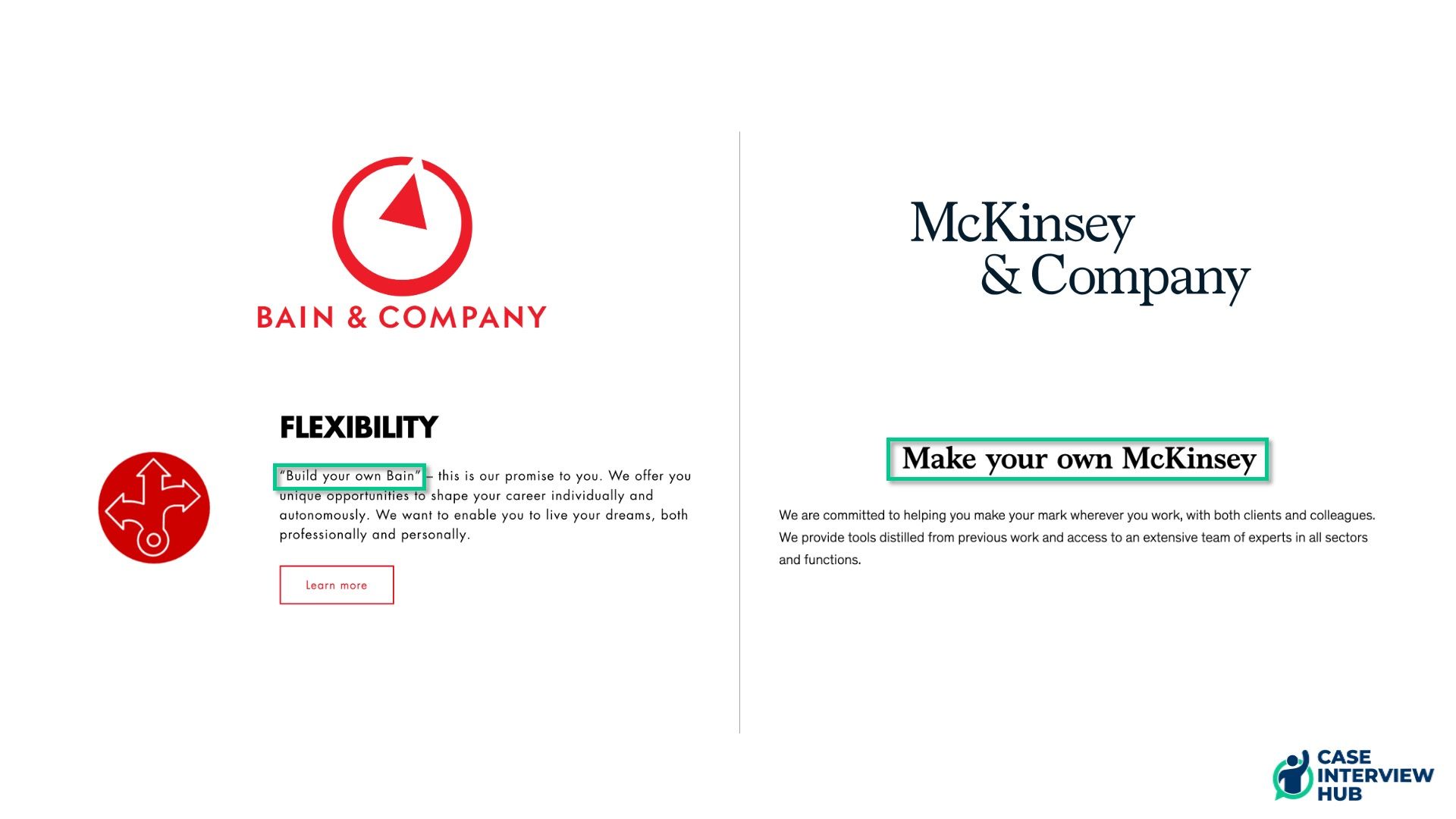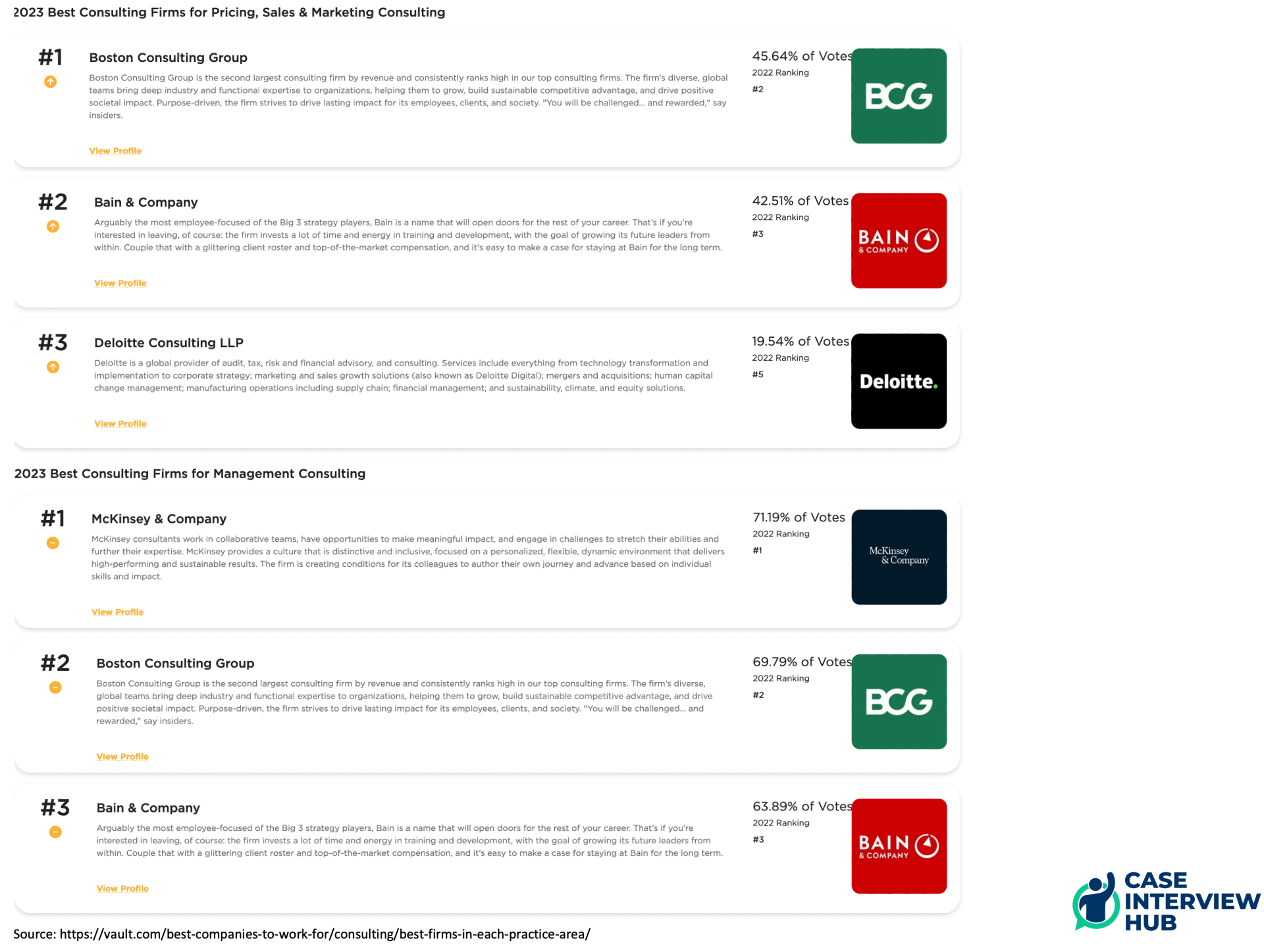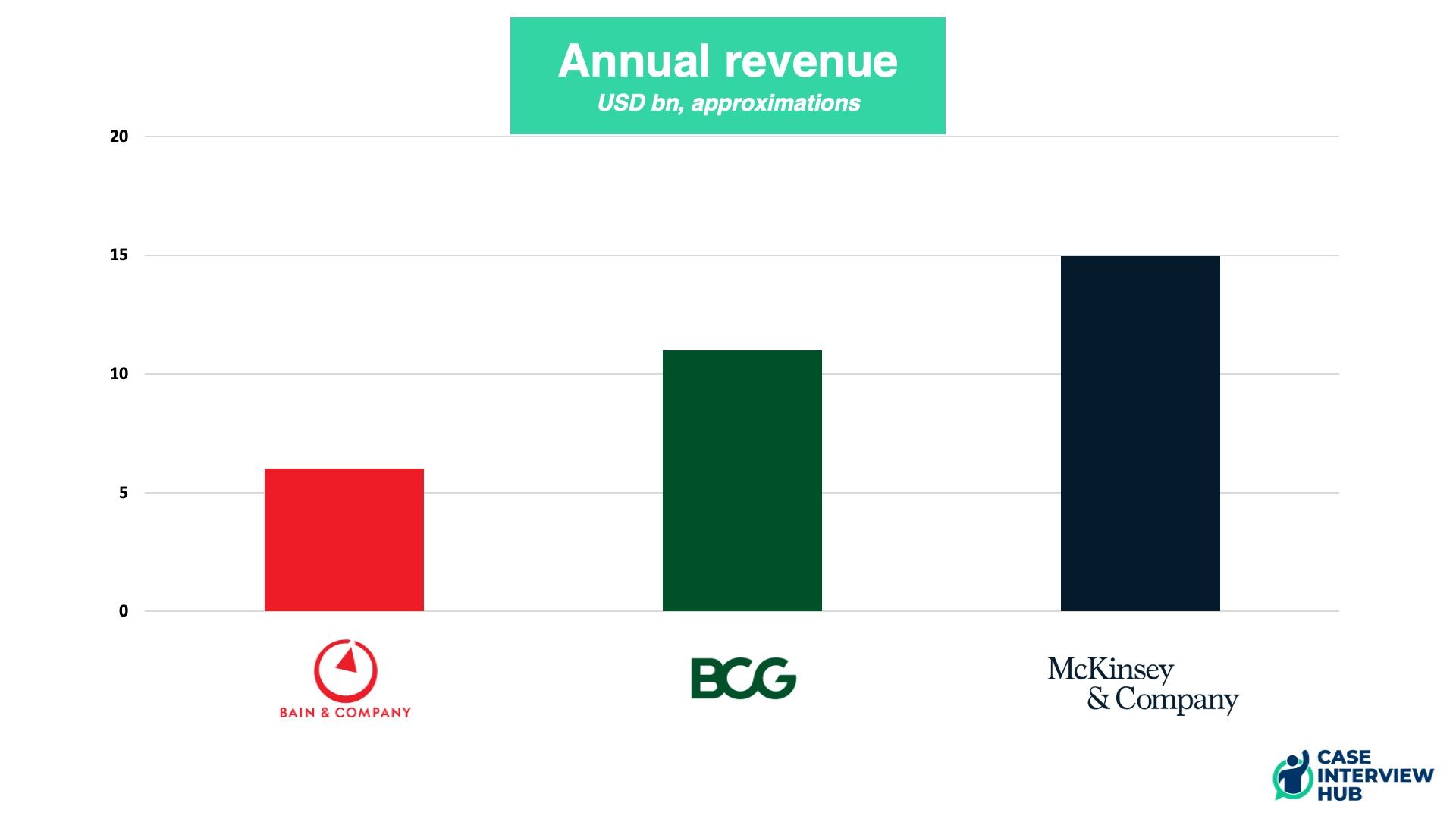The culture at McKinsey, BCG & Bain - is there a difference?
Students interested in consulting often ask whether there is a difference in culture between McKinsey, BCG, and Bain - not only online but also at recruiting events. Is there a difference in culture, type of work or the benefits? We share an insider perspective on the question and answer whether there is actually any significant difference.
Dec 8
/
Case Interview Hub
Public perception online
The differences between McKinsey, BCG, and Bain are a hotly discussed topic online. A quick search online will give all sorts of proclaimed differences. Based on this search, you would believe that Bain is the one with a collaborative culture, BCG uses adaptive problem solving, and McKinsey is the most structured one. The list goes on, but you’d be tempted to think those firms are doing entirely different things. Here is a list of the statements you can find online:

To get this right out of the way: these proclaimed differences in culture are all bullshit and whenever you read things like that you can be sure that the person never set foot in any of the MBB firms and is just trying to be a smart ass online. You also find statements like these online:
"A Bainie always helps out a Bainie!"
Ok sure, but do you seriously believe that they don’t collaborate at McKinsey or BCG?
The people in our team work or have worked at all the MBB firms and we will explain the similarities and differences between McKinsey, BCG & Bain in this article.
Similarities
Before we discuss any of the supposed differences, we wanna discuss why the firms are similar:
-
First, they offer a very similar service to the exact same clients. So the objective of the work is the same. Check out our article on the consulting industry to learn more about the type of work.
-
Second, they’re hiring from the same pool of people, primarily top universities around the world. And all of them hire business majors, but also more exotic backgrounds. Even the hiring processes are very similar. Have a look at our piece on how to join consulting for high level view on the recruiting process.
-
Third, you’ll learn very similar things. Even if there are differences, once you leave school and start your career, there are a couple of things you’ll learn at all of those places. You’ll learn to manage yourself while dealing with stress, create PowerPoint slides and Excel models, handle difficult clients and work in a team. Any of the 3 firms will provide you with a huge learning curve.
-
Fourth, the way these companies manage and develop people is largely the same. You will get very frequent feedback to develop in your role. You get frequent performance appraisals to see where you stand. You can be promoted pretty fast, but you might also be out the door pretty fast, given that all of the firms follow an up or out principle.
Knowing all this, it’s no surprise that the firms come up with similar things. You want to create your own path with projects you’re passionate about, flexible working models, and career development that excites you? Well then, come to Bain, where you can… Build your own Bain. Or come to McKinsey… Where you can make your own McKinsey.

So for the most part, working at these firms will feel quite similar. There are much larger differences between offices and regions than between the three firms.
Differences as a junior hire
Let’s start with the areas you might or might not find differences, and let’s first view it through the lens of a junior consultant.
Number 1 - Compensation and benefits
Here, the differences are again negligible. The entry level salaries are virtually the same and the minor differences might be reversed next year. McKinsey, BCG, and Bain try to outcompete each other but end up tracking each other when it comes to salary. The same goes for the benefits, so the corporate car policy or the policy around educational leave. This is not a difference maker at all.
Here, the differences are again negligible. The entry level salaries are virtually the same and the minor differences might be reversed next year. McKinsey, BCG, and Bain try to outcompete each other but end up tracking each other when it comes to salary. The same goes for the benefits, so the corporate car policy or the policy around educational leave. This is not a difference maker at all.
Number 2 - Industry focus
You often hear discussions around a particular company’s strength or weaknesses in any area. You might also stumble upon rankings like the ones below:
You often hear discussions around a particular company’s strength or weaknesses in any area. You might also stumble upon rankings like the ones below:

This often goes along the lines of, if you wanna do more banking, join BCG, and if you wanna do pharma, go to Bain. Very often those rankings are absolute nonsense as consulting firms do not disclose clients or revenue or project flow. Moreover, they don’t disclose it for specific industries. Be assured that those rankings are rubbish if you ask consultants or people at corporates to rank consulting firms.
Moreover, those rankings are irrelevant for you as a junior. Even if the rankings were true globally, in the region you live it might be the other way round. And in all likelihood you will end up in another industry after all. Which is not a problem at all. As a graduate you’ll hardly be able to assess, what industry and topic you like and what not. So you’ll figure it out along the way.
Number 3 - Size
This is an actual difference. McKinsey is the largest, BCG is somewhat behind, and Bain is the smallest of the three. Now, in your day to day life as a junior, this won’t matter. All the firms pass the threshold so that they can be considered large, global, consulting fixtures. There are, however, benefits to size, and they favor McKinsey.
This is an actual difference. McKinsey is the largest, BCG is somewhat behind, and Bain is the smallest of the three. Now, in your day to day life as a junior, this won’t matter. All the firms pass the threshold so that they can be considered large, global, consulting fixtures. There are, however, benefits to size, and they favor McKinsey.

The most wide-ranging presence across the globe gives you more opportunities. You’ll have a wider variety of projects to chose from. No matter the topic, industry, or region, it’s easier to find the expert you need. The support network tends to be better as well, from IT services all the way to visual graphics, so the guys helping you with slide design, purely driven by economies of scale. The alumni network is also largest, given that McKinsey is the largest and oldest firm.
And lastly, reputation, which is indirectly linked to size. McKinsey definitely takes the cake when it comes to reputation and prestige. Even people outside of consulting know it. The downside is that McKinsey is always the target if anything goes wrong in the consulting industry as a whole as McKinsey is largely used synonymous with strategy consulting. So you will have more heated arguments with friends, family, and maybe strangers, if you work for McKinsey.
And we do not want to play down the recent scandals at McKinsey. But if an article argues that McKinsey is working for Saudi Arabia, be assured that BCG and Bain are shaking hands with the same people.
Number 4 - The people
Again, the people will be very similar. They tend to be young, driven, and from a wide range of backgrounds. Some will say, chose the firm where you felt the best connection to the people in the interview. The truth, however, is that there’s such a variety of characters, that you can’t really make that decision just based on the couple of people you met. In all likelihood, you’ll never meet them again once you joined the company if they are not in your office. And your teams keep changing every 3 months as well. So if all your friends went to BCG, you can consider going there. But if that isn’t the case, you really shouldn’t base your decision too much on a couple of brief encounters in recruiting events or in your interviews.
Again, the people will be very similar. They tend to be young, driven, and from a wide range of backgrounds. Some will say, chose the firm where you felt the best connection to the people in the interview. The truth, however, is that there’s such a variety of characters, that you can’t really make that decision just based on the couple of people you met. In all likelihood, you’ll never meet them again once you joined the company if they are not in your office. And your teams keep changing every 3 months as well. So if all your friends went to BCG, you can consider going there. But if that isn’t the case, you really shouldn’t base your decision too much on a couple of brief encounters in recruiting events or in your interviews.
Differences as a senior hire
Let’s move on to senior hires, so project managers and above, all the way to partner. We will keep it brief here as this only applies to a selected view as McKinsey, BCG, and Bain mainly hire fresh graduates or people with only a couple of years of experience.
Number 1 - Compensation and benefits
As for compensation, they are all paid generously. If they pay a partner a million in one place, and 1.1 million in the other, it’s really not a factor that will alter your decision.
As for compensation, they are all paid generously. If they pay a partner a million in one place, and 1.1 million in the other, it’s really not a factor that will alter your decision.
Number 2 - Industry focus
Unlike for juniors, the industry focus, however, is a big factor. Especially as a partner, you are already an expert in an industry. Then you have a pretty clear idea which firm is strong in which sector, and region. If you are joining as a project manager in Japan with 8+ years of experience in insurance, you might realize that the largest insurance in the country has been a McKinsey client for the past 20 years. So if you are joining Bain, it’s unlikely that you will get the foot in the door. And as you can see, this is very MBB specific. It could be that BCG is serving the largest retailer in South America, while Bain is serving the largest one in the UK.
Unlike for juniors, the industry focus, however, is a big factor. Especially as a partner, you are already an expert in an industry. Then you have a pretty clear idea which firm is strong in which sector, and region. If you are joining as a project manager in Japan with 8+ years of experience in insurance, you might realize that the largest insurance in the country has been a McKinsey client for the past 20 years. So if you are joining Bain, it’s unlikely that you will get the foot in the door. And as you can see, this is very MBB specific. It could be that BCG is serving the largest retailer in South America, while Bain is serving the largest one in the UK.
If you are planning on joining from project manager upwards, you will touch upon these topics in your interview and very quickly find out, who the main clients in your industry and in your region are. Additionally, given the years of industry experience, you will likely know wich MBB firm has a strong relationship with which client. And you can later base your decision on which firm to join based on those insights.
Number 3 - Size
Size is not really that important for senior hires. It is much more important that the consulting firm is strong in your particular industry. If you are joining as a partner in automotive, you don’t really care about the size of the banking practice at the specific consulting firm, as you won’t do work in banking anyways.
Size is not really that important for senior hires. It is much more important that the consulting firm is strong in your particular industry. If you are joining as a partner in automotive, you don’t really care about the size of the banking practice at the specific consulting firm, as you won’t do work in banking anyways.
Number 4 - The people
While people are not that important for junior hires, they are for senior hires. As a senior hire, it is also much more important who the leaders in the respective industry at the consulting firm of your choice are. For example, Bain might have this relatively young senior partner with a lot of drive who is really bringing digital to pharmaceutical clients, while pharma at McKinsey in this region might be led by an older senior partner who is settled and mainly focuses on more traditional consulting work. So here the choice is really based on the senior hires preference on who they prefer to work with.
While people are not that important for junior hires, they are for senior hires. As a senior hire, it is also much more important who the leaders in the respective industry at the consulting firm of your choice are. For example, Bain might have this relatively young senior partner with a lot of drive who is really bringing digital to pharmaceutical clients, while pharma at McKinsey in this region might be led by an older senior partner who is settled and mainly focuses on more traditional consulting work. So here the choice is really based on the senior hires preference on who they prefer to work with.
But to emphasize this again. All these considerations are only relevant for senior hires that are joining as project manager or higher up the ranks. New joiners right out of college or with only a couple of years of experience don’t have to worry about any of that.
Which firm to join
Now the important question. Which firm should you join?
There are two scenarios:
-
If you have an offer from one of the MBB firms - congratulations! No matter which firm the offer is from, you will be just fine and have a great career start.
-
If you received multiple offers from the MBB firms - the objective answer here is simple: accept the McKinsey offer
And we are not stating that because we want to promote working there, but with the sheer size and prestige of McKinsey come some great benefits that BCG and Bain can’t offer (yet) to that extent.
First, the variety of projects. As McKinsey is the largest firm they also offer the widest range of projects. This can be an upside especially if you are looking to get staffed in more niche topics. BCG and Bain are by no means small firms - but they are significantly smaller than McKinsey.
Second, the global footprint and global staffing. McKinsey has offices all around the globe and they also staff people for projects across regions. We have worked all across the globe for McKinsey and it is something that BCG and Bain don’t offer to that extent. Moreover, McKinsey also offers global rotation programs, where you can switch to an office of your choice for 6 months with paid accommodation etc.
Third, support services. Here the advantage is clear, again due to economies of scale. McKinsey offers access to visual media - the people making your slides sexy - all around the clock given their global setup. Moreover, you have access to translation services, proofreaders, visual artists (for example to create comics or videos for more high-end presentations) - the list goes on. This just comes with the scale of McKinsey.
Fourth, the access to experts. Given its size, McKinsey has a global network of experts for literally any topic. So you just need to look them up on the intranet and reach out to them. Moreover, McKinsey also has dedicated researchers for all industries and sub-industries. You need to find out in how many factories Adidas and Nike are producing their apparel in - just reach out to a consumer goods researcher and he or she will look into it for you. And this also works for more niche topics.
Fifth, long term reputation. McKinsey is the oldest and largest consulting firm and often is used as a synonym for the consulting industry. Thus, people outside the business world sometimes also have heard about McKinsey which can be helpful. Even companies that had little interaction with consulting firms will know McKinsey and this might boost your chances of landing a job there.
Sixth, the alumni network. McKinsey has the largest alumni network of all the MBB firms due to its size. If you check out the McKinsey alumni network, you will likely find a senior manager at nearly any large corporate in your region who is a former McKinsey. This of course heavily depends on the region, but the likelihood is very high. And as for all MBB firms, you feel part of your firm also after you left. So the chances that the person replies to you if you reach out are fairly high.
Of course, if you are looking to work in one dedicated industry and already know that you are planning on staying long-term in consulting, you should join the firm where you know that respective industry leader best and know about clients and project flow. But we think this is the case for the minority of candidates looking for a job in consulting.
Conclusion
So overall, you shouldn’t spend one minute worrying about the culture at the specific MBB firm. It’s an absolute waste of time. And if you stumble upon someone online who claims that a Bainie always helps a Bainie, McKinseys are academic, and BCG are entrepreneurial you will know right away that the person has no clue.

